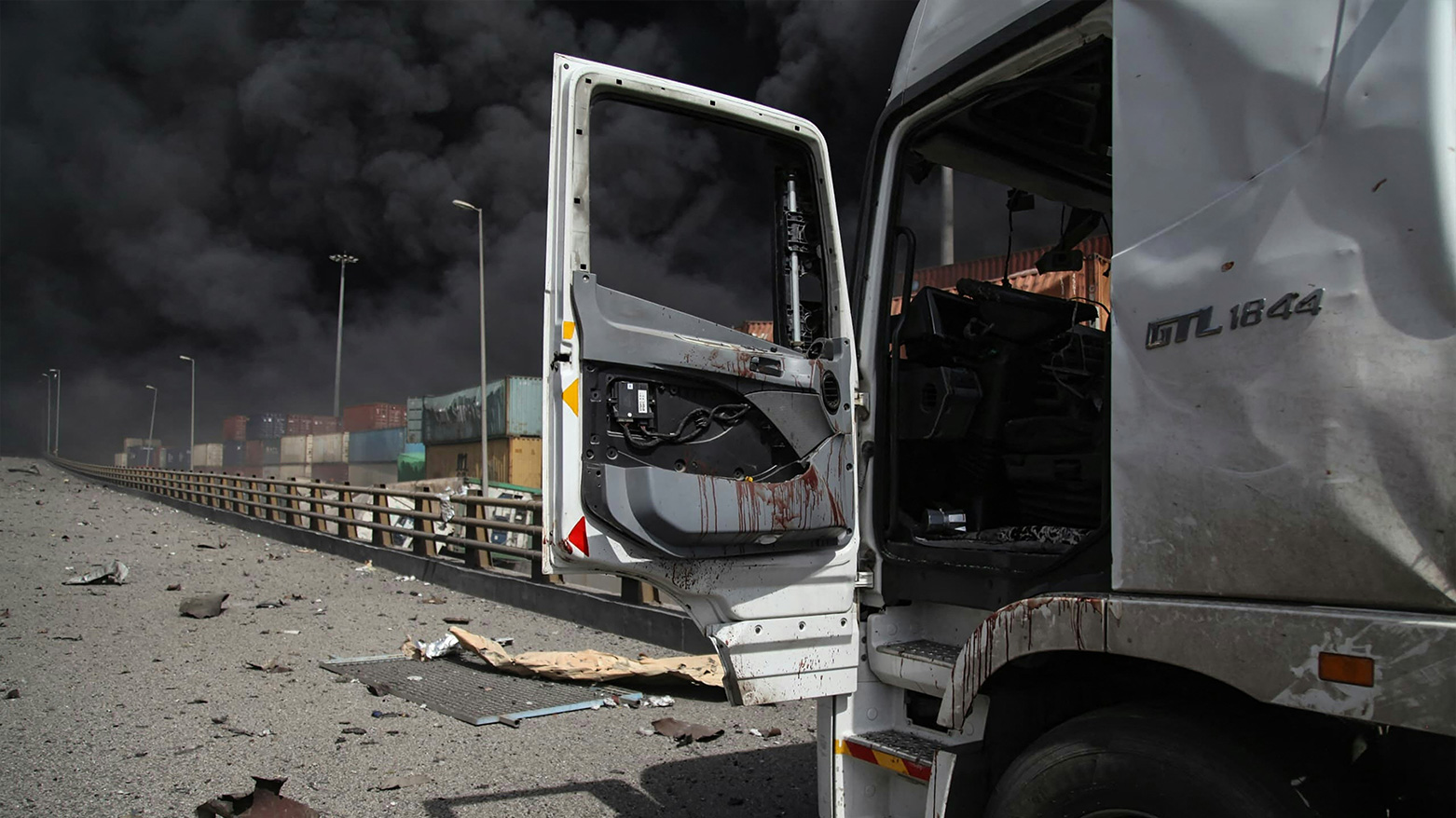25 Dead, Toxic Fears Rise After Iran Port Blast
The cause of the explosion remains unclear, though a source linked to Iran’s Revolutionary Guard told The New York Times that sodium perchlorate, a major component of solid fuel for missiles, might have exploded.

By Kamaran Aziz
ERBIL (Kurdistan24) — A powerful explosion rocked Iran's Shahid Rajaee Port in western Bandar Abbas on Saturday, killing at least 25 people, injuring more than 800, and sending shockwaves throughout the country, as authorities scramble to investigate the cause and manage the aftermath of the deadly incident.
According to official reports from Iranian media, Mojtaba Ghahremani, Chief Justice of Hormozgan Province, announced that the provincial forensic department had been placed on high alert from the earliest moments following the blast, focusing on the critical task of identifying the deceased. As of Sunday morning, 21 bodies had been delivered to the forensic office, with four additional bodies in the process of being transferred, bringing the total number of fatalities to 25. Of these, 10 victims — two women and eight men — have been formally identified.
Judicial orders have been issued for the release of the bodies to their families, allowing the mourning process to begin amid widespread national grief. Ghahremani stressed that identification efforts remain ongoing.
The explosion, whose exact cause remains under investigation, struck one of the operational zones within the sprawling Shahid Rajaee Port complex. The state-run Islamic Republic News Agency confirmed that, despite the blast, port operations for fuel, bulk goods, and container shipments continued largely uninterrupted in other zones.
The report by IRNA emphasized that emergency response teams had made significant progress in containing the fire triggered by the explosion.
The Iranian Minister of Roads and Urban Development, Farzaneh Sadegh, affirmed that firefighting operations remained under the direct supervision of the Minister of Interior and crisis officials, while cooperation between military, police, and firefighting units was critical in bringing the fire under containment. Movements within the port have since been normalized, according to officials.
The Speaker of Iran’s Parliament, Mohammad Baqer Qalibaf, expressed condolences on Sunday following the deadly explosion at Shahid Rajaee Port, describing the loss of life and injuries as "heartbreaking." Addressing lawmakers during an open session, Qalibaf emphasized that providing urgent medical assistance to the injured and ensuring close coordination among government agencies had become top priorities under the directive of newly elected President Masoud Pezeshkian.
In response to the incident, Qalibaf announced the formation of a parliamentary delegation tasked with investigating the circumstances surrounding the explosion. The team, drawn from the Commissions on Construction, National Security and Foreign Policy, Interior and Councils, and Health and Treatment, has been directed to visit the site, assess the situation, and submit a detailed and transparent report to Parliament and the broader public.
Responding swiftly to the disaster, the National Iranian Oil Refining and Distribution Company issued a statement clarifying that the explosion had no connection to nearby refineries, fuel storage facilities, or oil pipelines. It stressed that refinery operations in Bandar Abbas continued uninterrupted. Nonetheless, the company confirmed that emergency and firefighting resources from across the oil sector had been mobilized to support the Ports and Maritime Organization's crisis response.
In a move underscoring the seriousness with which Tehran is treating the incident, Eskandar Momeni, a senior official, was dispatched to Bandar Abbas by direct order of the President to lead an on-the-ground investigation into the explosion.
As of now, the precise cause of the explosion remains a mystery, fueling speculation across Iranian media. As reported by The New York Times, a person with ties to Iran’s Islamic Revolutionary Guard Corps suggested that sodium perchlorate, a major component of solid fuel for missiles, might have exploded. The security firm Ambrey, cited by The Associated Press, also indicated that improper storage of sodium perchlorate at the port could have triggered the blast. However, Iranian officials have refrained from suggesting any deliberate act of sabotage.
Iran's health ministry declared a state of emergency in Hormozgan province due to airborne toxic pollutants, urging residents to stay indoors, close windows, and wear masks.
Footage from the scene, verified by The New York Times, showed immense clouds of black smoke rising over the port, with the fire still raging hours after the initial explosion. Shahid Rajaee Port, which handles 85 percent of Iran’s container traffic and a substantial share of its oil exports, is a critical artery for the country’s economy. Analysts warn that even a temporary shutdown could inflict severe economic damage.
Bandar Abbas, strategically located along the Strait of Hormuz — a vital global oil and gas transit route — has previously been a focal point of geopolitical tensions. In 2020, Israeli cyberattacks reportedly disrupted operations at Shahid Rajaee Port, although no evidence has yet emerged linking Saturday's explosion to foreign sabotage. In an apparent effort to counter online speculation, the Iranian attorney general's office condemned "online activists" spreading rumors that could undermine public morale.
The blast also coincided with sensitive diplomatic efforts, as American and Iranian officials began another round of talks in Oman regarding Iran's nuclear program. Tensions in the region remain high, with recent reports indicating Israeli contemplation of strikes against Iranian nuclear facilities.
Authorities have pledged a full and transparent investigation into the Shahid Rajaee Port disaster, seeking to uncover the causes and address vulnerabilities that allowed such a devastating incident to occur.
